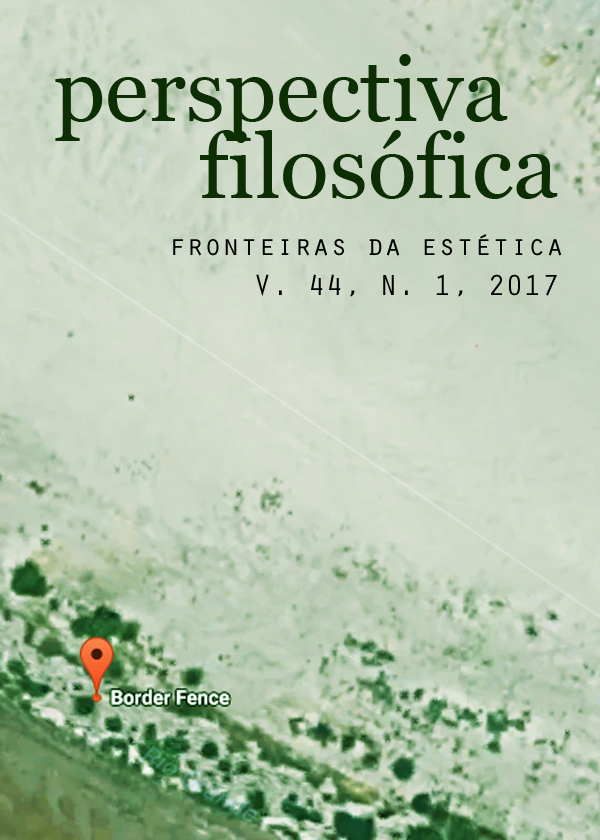A ovelha não foge porque o lobo não é belo, mas porque é seu inimigo natural: os fracassos de Kant e as fronteiras entre o estético e o metafísico-religioso
DOI:
https://doi.org/10.51359/2357-9986.2017.230359Keywords:
aesthetics, metaphysics, Kant, Thomas Aquinas, sensus communisAbstract
We believe that Kant was wrong in his attempt to deduce the principle of universality of what is produced in simple judgment, whose paradigm is pure aesthetic judgment of the beautiful. That is, Kant is not able to prove with a transcendental argument the right to presuppose a priori a “common sense” (sensus communis) and thereby the possibility of an intersubjective, non-objective validity. But, it seems that Kant‟s failure is more enlightening than his “achievement”. The kind of principle that he was really searching for, as a matter of fact, has a long history. We find quite instructive indications in the psychology of the perfect animal developed by St. Thomas Aquinas (for instance, in the Summa Theologica I, q.78, a.4 and in the Disputed Questions on the Soul q. XIII). However, these indications need to be adjusted in view of Aquinas‟s vast and complex philosophy. Some characteristics of the Thomist approach can be helpful to understand why sensus communis could not be deduced by an idealist proof, based on the objectivity of knowledge, but rather only by a “realist proof”, which starts from the observed complexity of natural and psychic phenomena, both in humans as well as in other animals.References
ALLISON, H. (2001) Kant’s Theory of Taste. A Reading of the Critique of Aesthetic Judgment. Cambridge: Cambridge University Press.
ARISTÓTELES. (2010) Sobre a Alma. Trad. Ana Maria Lóio. Lisboa: Imprensa Nacional-Casa da Moeda.
AQUINO, Tomás. (1990) Suma Contra os Gentios. V.I. Porto Alegre/Caxias do Sul: Escola Superior de Teologia São Lourenço de Brindês/Livraria Sulina Editora.
AQUINO, Tomás. (2001) Suma Teológica. I Parte – Questões 1-43. São Paulo: Loyola.
AQUINO, Tomás. (2002) Suma Teológica. I Parte – Questões 44-119. São Paulo: Loyola.
AQUINO, Tomás. (2012) Questões Disputadas sobre a Alma. São Paulo: É Realizações.
AQUINO, Tomás. (2013) Questões Disputadas sobre o Poder de Deus. Campinas: Ecclesiae.
CARVALHO, M. S. (2013) “Introdução”. In: AQUINO, Tomás. O ente e a essência. Porto: Edições Afrontamento.
CHESTERTON, G.K. (2004) Saint Thomas Aquinas. The Catholic Primer. Disponível em . Acesso em: nov. 2015.
CLEMENS, C. (1972) Chesterton As Seen by His Contemporaries. New York: Gordon Press.
ECO, U. (2014) From the Tree to the Labyrinth. Historical Studies on the Sign and Interpretation. Cambridge/London: Harvard University Press.
FERREIRA, M. C. “O subjetivismo absoluto”. In: (1992) Recepção da Crítica da Razão Pura: Antologia de Escritos sobre Kant (1786-1844). Lisboa: Fundação Calouste Gulbenkian.
GARDEIL, Henri-Dominique. (2013a) Iniciação à Filosofia de São Tomás de Aquino: introdução, lógica, cosmologia. São Paulo: Paulus.
GARDEIL, Henri-Dominique. (2013b) Iniciação à Filosofia de São Tomás de Aquino: psicologia, metafísica. São Paulo: Paulus.
GRUPILLO, A. (2016) O homem de gosto e o egoísta lógico: uma introdução crítica à estética de Kant. São Paulo: Loyola.
GUYER, P. (1997) Kant and the claims of taste. Cambridge: Cambridge University Press.
KANT, I. (2001) Crítica da Razão Pura. Lisboa: Fundação Calouste Gulbenkian.
KANT, I. (2002) Crítica da Razão Prática. São Paulo: Martins Fontes.
KANT, I. (1983) Investigação sobre a evidência dos princípios da teologia natural e da moral. Trad. Alberto Reis. In: Textos Pré-críticos. Porto: Rés
KANT, I. (1968) Kritik der Urteilskraft. In: Immanuel Kants Werke, v.5, Akademie-Textausgabe. Berlin: Walter de Gruyter & Co., 1968. [Crítica da Faculdade do Juízo. Rio de Janeiro: Forense Universitária, 1995.]
Lewis & Short. A Latin-English Lexicon. Disponível em: <http://www.perseus.tufts.edu/hopper/>. Acesso em: out. 2016.
MACMILLAN, C. (1985) Kant’s Deduction of Pure Aesthetic Judgments. In: Kant-Studien, n.76, 1985, 43-54.
MOORE, G.E. (1999) Principia Ethica. Lisboa: Fundação Calouste Gulbenkian.
PLÍNIO, o Jovem. Epístolas III. 1,1-2. Disponível em: <http://members.aon.at/latein/Plinius14.htm>. Acesso em: out. 2016.
ROUSSELOT, Pierre. (1999) A Teoria da Inteligência Segundo Tomás de Aquino. São Paulo: Loyola.
SCHELLING, F. (1980) Cartas filosóficas sobre o dogmatismo e o criticismo. São Paulo: Abril Cultural (Coleção Os Pensadores).
SCHELLING, F. (2014) Filosofia della Rivelazione. Milano: Bompiani.
TELLKAMP, J. A. (2012) Vis aestimativa and vis cogitativa in Thomas Aquinas’s Commentary on the Sentences. In: The Thomist 76 (2012): 611-40.
VACCARI, U.R. “Introdução”. In: FICHTE, G. (2014) Sobre o espírito e a letra na filosofia. São Paulo: Humanitas/Imprensa Oficial do Estado de São Paulo.
Downloads
Published
Issue
Section
License
A Revista Perspectiva Filosófica orienta seus procedimentos de gestão de artigos conforme as diretrizes básicas formuladas pelo Conselho Nacional de Desenvolvimento Científico e Tecnológico (CNPq). http://www.cnpq.br/web/guest/diretrizesAutores que publicam nesta revista concordam com os seguintes termos:
Os autores mantém os direitos autorais e concedem à revista o direito de primeira publicação, sendo o trabalho simultaneamente licenciado sob https://creativecommons.org/licenses/by/4.0/deed.pt_BR que permite o compartilhamento do trabalho com reconhecimento da autoria e publicação inicial nesta revista.
Os autores têm autorização para assumir contratos adicionais separadamente, para distribuição não-exclusiva da versão do trabalho publicada nesta revista, com reconhecimento de autoria e publicação inicial nesta revista (Consultar http://opcit.eprints.org/oacitation-biblio.html).

Esta revista está licenciada com uma Licença Creative Commons Atribuição 4.0 Internacional.













